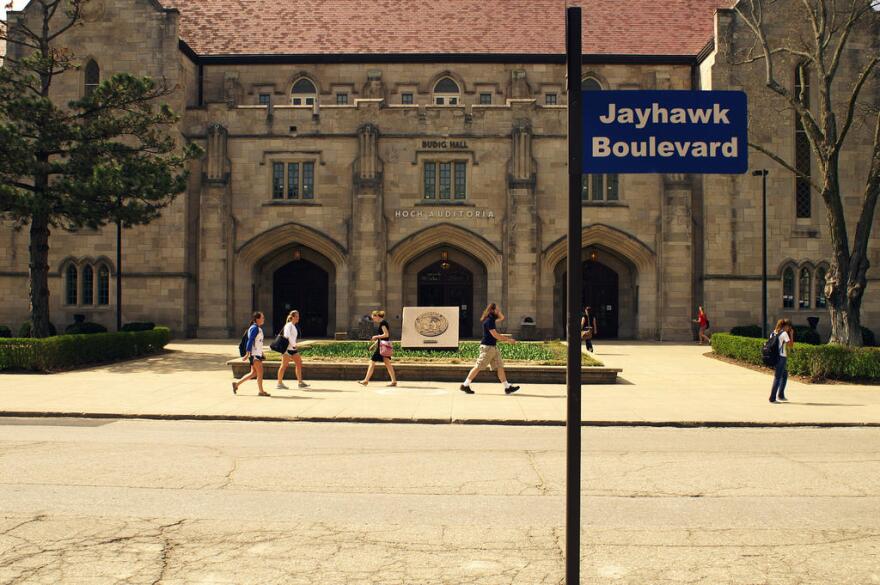A former University of Kansas student whose parents sued KU for consumer fraud after they say she was raped on campus has now filed her own lawsuit against the university.
Daisy Tackett’s lawsuit seeks unspecified damages for violations of Title IX, the 1972 federal law that bars sex discrimination in education.
The suit, filed today in Douglas County District Court, says KU created a hostile environment by housing KU football players in a residence hall, Jayhawker Towers, that it had reason to know was unsafe.
Tackett alleges that at least four other sexual assaults had been reported at Jayhawker Towers before she was raped there by a football player in the fall of 2014 and at least two others after that.
She says she reported her rape to KU about a year after it allegedly happened, when she learned of another sexual assault involving the same football player, who is identified in the lawsuit only as John Doe G.
Erinn Barcomb-Peterson, a spokeswoman for KU, responded in an email that the university doesn’t comment on individual sexual assault investigations.
“As we said in response to the Tacketts' first lawsuit earlier this month, any suggestion that we do not support those who report sexual assault on our campuses is baseless,” Barcomb-Peterson said.
At a news conference in Kansas City, Tackett’s father, James Tackett, read a statement from his daughter.
“I reported my rape because I thought other KU students were at risk. I did not know that KU would treat me the way it did. I did not feel safe after my report,” the statement said. “My coaches did not care. I felt like I did every single thing KU asked of me, and I feel that they did not hold up their end of the bargain. KU did not protect me. And I was not able to be a student or an athlete there.”
The statement continued:
“I hope the KU community understands why I had to do this. KU cannot be allowed to operate under the status quo. Kansas has rich history of standing up for what is right. It's why we are Jayhawks. This is my contribution to that proud tradition and I hope Kansans and Jayhawks will stand with me.”
Earlier this month, Tackett’s father and mother, Amanda Tackett, filed a class action lawsuit against KU under the Kansas consumer protection law. The novel legal case claims that KU falsely represented that its dorms are safe and secure, and seeks damages on behalf of anyone who enrolled a student at KU in the past three years.
One of the Kansas City law firms that represents the parents, Brown & Curry, also represents Daisy Tackett.
In response to that lawsuit, KU said that the allegations were “baseless” and it provides an array of services designed to keep students safe.
Suit says rowing coach retaliated
Daisy Tackett, a varsity rower and a member of the Student Senate, withdrew from KU in January, according to her lawsuit. She now lives with her parents in Florida.
She claims that sometime after her alleged rape, she encountered John Doe G a couple of times on campus and experienced anxiety and panic. KU finally expelled him only this month – four months after her report, the lawsuit alleges.
Tackett also claims the rowing team coach retaliated against her, telling her she couldn’t attend a training trip in December 2015 in Florida. When she told him about her rape, the university’s investigation and how much the trip meant to her, he told her she needed to pass a fitness test first, according to the lawsuit.
She says she passed it the very next day but was still prevented from going, although less experienced and slower rowers were allowed to go.
After she went home to Florida, she says, the coaches asked her to return her equipment, consisting of spandex sweatpants, t-shirts and sports bras. And KU told her it would be billing her for the semester and placed an administrative hold on her transcripts, according to the lawsuit.
Tackett’s petition cites KU’s 2015 Clery Act report – which requires universities to publish their crime statistics – to back up her claim that KU’s residence halls are unsafe. The report stated that in 2014 there were 14 rapes, 10 of them in the dorms. In 2013, there were 13 forcible sex offenses, nine of them in the dorms, according to Tackett’s petition.
By contrast, in 2012, only three forcible sex offenses were reported, two of them in the dorms.
A study last year of 31 large colleges and universities by a KU law professor, Corey Rayburn Yung, found that many schools understate the number of sexual assaults on campus. The study, which was published in a journal put out by the American Psychological Association, found that when the schools were audited by the U.S. Department of Education, they reported 44 percent more sexual assaults on average than they had previously.
Dan Margolies, editor of the Heartland Health Monitor team, is based at KCUR. You can reach him on Twitter @DanMargolies.






